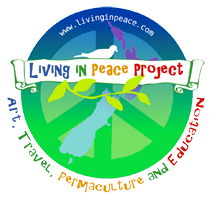From our friend Brigitte right now on the road in New Zealand:

Imagine if every traveller and every business took responsibility for their carbon footprint. This is the vision of Paul Murray, founder of the Living In Peace Project in Karamea.
Paul was inspired by Douglas Tompkins, the founder of North Face and Esprit clothing businesses, who, on the sale of his companies for $120 million, purchased 900,000 ha of virgin forest in Chile to “preserve it from development.” Paul explains:
I wasn’t anywhere near as cashed up as Mr Tompkins, but loved the essence of what he was doing and his motivation for doing it. I had the opportunity to purchase a much smaller piece of forest and did so.
In 2001, Paul purchased and committed to maintaining a 80-acre (31 ha) forest bordering on the Kahurangi National Park. The Living in Peace Project is funded through his businesses including Rongo Backpackers & Gallery and Karamea Farm Baches. He wanted to capture carbon to mitigate the environmental impact of his businesses.
My accountant refers to the forest as a “non-performing asset,” but I don’t see it that way, it definitely performs a function and that is to enable us to take full environmental responsibility for the carbon cost of our business and that is important to me.
I want to be able to raise my hand and say that “I am an environmentally responsible business person” and that means I want to have a successful business, without damaging the environment in the process. I want to take full responsibility for every aspect of my business and always seek to minimise the environmental impact of my business activities.Paul actively encourages people from all over the world to visit Karamea, which is possibly the most remote town on mainland New Zealand, which is also a country a long way from any other. There is a carbon cost for people to visit his business and he meets that by maintaining the forest, which absorbs CO2 and turns it into wood. There are also some incredible rata trees on the property that he estimates are over 1,200 years old.
To stand in the forest and be present is very inspiring for me. The forest provides everything it needs to grow and thrive and recycles all waste material in a way that sustains it. It requires no inputs other than freely available resources of water, sunshine and soil. It’s a perfect system and I believe the path to sustainable business is to strive to be like the forest…biomimicry.Paul acknowledges that while tourism businesses have a responsibility to offset the impact of their businesses, travellers also need to do their part to minimise and offset their carbon footprint. He believes that although many people are becoming more aware about the carbon cost of their travel, others have not really considered it
See Info about Living in Peace Project

The Living in Peace Project is based in Karamea at the top of the West Coast of the South Island of New Zealand. Karamea is enveloped by the Kahurangi National Park on three sides and sealed in by the Tasman Sea. It is a region of great scenic beauty and ecological significance.
The Living in Peace project combines elements of art, travel, permaculture and education to create an environmentally, socially and economically sustainable business. Rongo Backpackers & Gallery and Karamea Farm Baches form the financial base of the project and support the development of the project by providing income to fund expansion. The eco-tourism businesses incorporate art, permaculture (permanent organic agriculture), and volunteerism, into their management structures and strive to be energy efficient, progressive thinking, professional and profitable.
The project is involved in so many GOOD initiatives! We have highlighted a few below but we also recommend visiting their website for more information and inspiration!
- Solar Hot Water: Rongo Backpackers & Gallery has not used any electricity to heat water since 2005. The water is heated with a solar system and augmented with a wood-burning water heater and a wetback system on the living room fireplace. This is a significant cost saving in terms of economics and the environment. Karamea Farm Baches also have solar pre-heaters installed to defray the cost of heating the water with electricity and solar systems will be installed to heat the water at the baches in future.
- Carbon Sink: A 31-hectare (80-acre) regenerating bush property provides a carbon offset for the emissions associated with the business. To encourage people to fly to New Zealand from Europe, Asia and America and other parts of the world incurs a carbon cost that they want to take responsibility for. To counter this, they keep the bush block as a carbon sink to absorb the carbon we produce in the service of our business. The property doubles as an attraction and they plan to build a simple camp ground there to enable people to enjoy the property and have an experience that is not possible in many parts of the world
- Permaculture Farm: The project aims to be self-sufficient in the production of food––fruit, vegetables, meat and firewood––in addition, they provide locally grown organic meals to our guestomers. They operate on a “no waste” model, with simple, organic, healthy meals locally produced from seasonal fruit, vegetables, venison, beef, lamb, pork, chicken, fish and other seafood etc

/image%2F1152236%2F20191031%2Fob_cdc6f8_hans-peter.jpg)